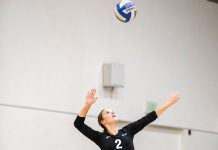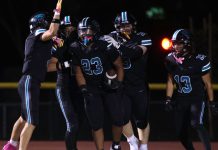Fly fishing vs. competing with the pros for bass? The best local
spots for a fun day of angling? Just why this area has the upper
hand on Eureka? WON Bass tour fisherman Jason Ballew, a Hollister
resident, shares insights on his sport as staff writer Scott
Campbell sits down with another impact player in South Valley
athletics.
dispatch: Jason, I’m glad we have the chance to sit down with you for a bit. Tell us what most interests you about fishing.
Jason Ballew: Competition. I’ve played sports my whole life and there’s not many things you can compete at at 36. I’ve fished my whole life. Once I discovered (tournament fishing), it was a natural fit.
disp: What initially got you into the sport?
JB: When I moved down here, there wasn’t the kind of fishing there was back home (Eureka). Have you ever been to Eureka, Calif.? There’s nothing to do. I didn’t drink. I didn’t party. And there’s ample opportunities to be outside, fishing and stuff like that. I drove around with a fishing pole in my car and surfboard on the roof. That’s what I did.
disp: I understand you’re a building contractor. Is there any chance fishing could become your permanent profession?
JB:: There’s a small number of guys, like in any sport, that can make their livings at their sport. Me personally, I’m not sure if I’m willing to make the commitment to fish on the national level, which is where that kind of money will be. But you never know. You’ve got to keep aiming up.
disp: What kind of money are we talking about here? Entry fees? Winnings?
JB: The tournaments I fish, first place is guaranteed $20,000. Entry fees, depending on the tournament, are anywhere from $650 to $1,200 for the U.S. Open. More money goes into gas, travel and lodging than tournament entry fees. And missed work.
disp: You’re 12th in the WON Bass Pro Northern Angler of the Year standings, very impressive for your first pro season. How tough will it be to climb into the top-10 and beyond?
JB: I’ve only been bass fishing for five or six years, so for me to compete against the caliber of guys I’ve been fishing against, I need to be more meticulous, better prepared and more thorough. That’s the difference between a first-year pro finishing 60th and finishing where I finished. As for next year, I made some key mistakes in a couple of tournaments this season and lost fish at very critical times. That was the difference this season for me being 12th or even higher in the standings, so if I continue to work as hard as I did this year and eliminate some of the mistakes I made on the water … I would like to think I could well up into the top-10 next year. Problem is, it’s still fishing.
disp:: Give us a loose description of a typical competition, the time of day, the interaction between the competitors, the general mood.
JB: Tournaments are always at safe light, so you’re usually up at 4:00 and have your boat in the water at 5:30. Once everyone’s in the water, depending on the order we go out, you pretty much stay out of everyone’s way until it’s your turn. It’s probably the most exciting moment of any tournament. Once you get ready to go, you reach over and shake your partner’s hand and then it’s a 70-plus mph ride to wherever our first spot is.
Once you’re at your spot, usually in your mind, you’re constantly making decisions – whether to stay there or go, adjusting to weather conditions or water conditions. And that’s probably one of the most difficult parts of fishing because it’s really hard not to second guess yourself.
The only other thing that comes in is you’ve got to utilize your time in the water to maximize your opportunities to catch the kind of fish you need to win a tournament.
The last thing is, watch the clock and don’t be late – otherwise you get penalized. I’ve been close a couple of times. I’ve never been late. I’ve been within 30 seconds, fishing to the last cast.
disp: What goes into scoring in these tournaments?
JB:: Most formats, you have a pro and an amateur, with different amateurs each day. And your heaviest five fish, together, equals both anglers’ weight that day. The two-day tournament, your first day with one amateur and the second day with the other amateur, is your weight for the tournament.
disp: Best two-day haul?
JB:: Almost 41 pounds.
disp: That’s a lot of bass.
JB: Yeah. That was in the Delta. And on the second day, we lost a 12-pounder that would’ve put me in the top-five if we could’ve boated that fish. That was it. A perfect tournament with one mistake. One bite was the difference between 33rd and being in the top-five. It was the only time I cussed on my boat all year.
disp: What happens to the fish in these tournaments?
JB: They have a live release boat. It’s a specialty boat that has a huge water tank on it and they pump oxygen and … it helps the fish recuperate from being in the live well in the boat and the stress of being caught. They resuscitate the fish, and when the fish are in good shape, they release them.
disp: Five words to describe your boat.
JB: My most important fishing tool. Everything else is worthless without it.
disp: How much horsepower are we talking?
JB: 200. 70 mph on the water. Organized in the morning. Disaster in the afternoon.
disp: Any tips on hot local fishing holes or nearby weekend getaways that get the Ballew stamp of approval?
JB: My favorite local lake, without a doubt, is Los Banos Creek Reservoir. It’s a very difficult lake to be successful at, which is one of the reasons I like it. You don’t get to be lazy when you’re fishing there. San Justo’s fun, too, but it’s very dissimilar to any lake I fish on, whereas Los Banos is a miniature Clear Lake. Our North region consists of three of the best waterways in the state, which would be the Delta, Clear Lake and Lake Shasta. All of them are big, so any time you get to travel and fish them, it’s information in the bank.
disp: Do you enjoy fly fishing, or is that crossing over to the dark side?
JB: I’ve been fly fishing since I was probably 10-years old. Growing up as a trout fisherman, I spent a lot of time with a fly rod in my hands and I occasionally still tie flies. The dark side? That’s great! We used to think the bass guys were nuts when I grew up. We didn’t understand them at all. Now that I’m on the other side of the equation, they both have their things that make it rewarding. I don’t believe there’s a dark side to either one.
disp: What qualities are important for a fisherman?
JB: You’ve got to be tenacious. Can’t quit. I would say you’ve got to be a thinker. That’s actually a really good question. … You’ve got to be disciplined. And to be successful at it, you have to be willing to work at it. You’ve got to be as aggressive as possible. You can’t sit and wait. You’ve gotta go get ’em.
disp: What do you do outside of the boat to prepare for competition? What type of practice routines or preparation do you use for these tournaments?
JB: I spend a lot of time looking at topography maps where the tournament is going to be. I keep a very close eye on weather conditions where the tournament is. In the weeks before the tournament, watching what the weather is doing. I spend a lot of time on the computer looking for fishing reports and articles from that lake at that time of the year previously. Many of these lakes I’ve fished plenty of times as a pro or an am, and I keep personal notes from my previous trips to that lake and get all that information for a starting point before I ever get there.
disp: You spoke of the adrenaline rush when the boat first kicks into gear. Describe that feeling for us.
JB: It’s a rush of absolute anticipation because you don’t know what’s coming. Everything may go according to plan and you’ll have a successful day. Or, everything may blow up first, whether it be a broken boat, somebody on your first, best fishing spot. But the adrenaline comes from raw anticipation from the day to come.
disp: Funniest moment in a tournament?
JB: Oh man. There’s been some stupid things. It’s hard to pick because so many of the guys are so colorful. I would say, at a bass event last year, a friend of mine, who’s a pro – he’s a hot-dogger guy, he doesn’t live that far away from here – he’d fallen off his boat while trying to land a fish during the tournament. He comes to weigh-ins soaking wet and very upset. And, in front of hundreds of people standing on the dock, puts his trolling motor in the water, steps on the pedal and … the boat goes one way and he goes the other in front of everyone. Some very colorful language ensues after that while he tries to get back in his boat and try to look cool. Watching him trying to get out of the water, I don’t care if you’ve never driven a boat before, it was pretty classic. In front of all his buddies.














